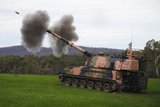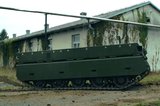BAE Systems wins Swedish BvS10 contract
BAE Systems has announced that it has been awarded a contract from the Swedish Defence Materiel Administration, FMV, for the BvS10 armoured all-terrain vehicle. Under the contract BAE Systems will provide 48 vehicles and an extensive initial support package.
According to the company, the contract award follows the down-select of the BvS10 on 5 Jan 2012. It provides options for an additional 127 vehicles and an even more comprehensive sustainment package which could include in-theatre support. The initial value is £65 million, which would more than triple if all options are exercised.
The FMV launched the competition in June 2011. Contract-specific features on the BVS10 include enhanced crew ergonomics and protection, integration of the Protector remote weapon station, radio and battlefield management systems. Smoke grenade launchers will also be fitted to give 360 degrees coverage around the vehicle.
BAE Systems said the 48 BvS10s will be delivered in troop carrier, command vehicle, ambulance and logistic carrier variants. They will be manufactured in the newly-refurbished production facility in Örnsköldsvik with first deliveries in October 2012 and the final vehicle to be delivered in November 2013.
Sweden will join the UK, the Netherlands and France in operating the BvS10.
More from Land Warfare
-
![World Defense Show 2026: DOK-ING working on MV-8 variants and reveals specs ahead of Eurosatory]()
World Defense Show 2026: DOK-ING working on MV-8 variants and reveals specs ahead of Eurosatory
The Croatian company began the development of the MV-8 modular uncrewed platform in the early 2020s. Specifications for the vehicle were revealed to Shephard at World Defense Show 2026.
-
![World Defense Show 2026: Turkish and European industries will cooperate, says Aselsan boss]()
World Defense Show 2026: Turkish and European industries will cooperate, says Aselsan boss
Aselsan was formed 50 years ago in response to difficulties Turkey was facing in sourcing major systems internationally. While some challenges still remain, company president Ahmet Akyol believes a rapprochement is possible.
-
![World Defense Show 2026: Russia reveals details of new loitering munition]()
World Defense Show 2026: Russia reveals details of new loitering munition
The Kalashnikov RUS-PE cannister-launched man-portable loitering munition was displayed as a model at World Defense Show 2026 with a company official telling Shephard it was “in service and in low-rate initial production”.
-
![World Defense Show 2026: MARSS displays new Nation Shield air defence C2 system]()
World Defense Show 2026: MARSS displays new Nation Shield air defence C2 system
Nation Shield is the latest iteration of the MARSS C2 system and is designed to provide C2 further forward along with more capable air defence.























